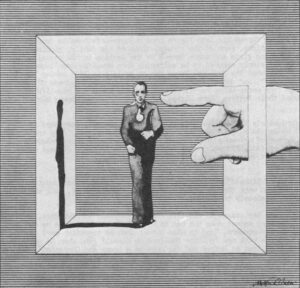Releasing bits and pieces of a new theory in progress is hazardous. It stimulates the pounce reflex in television producers, talk show hosts and documentary filmmakers. They all want to do an in-depth interview now. “It will only take a day of your time.” Lecture bureaus hound. University departments and professional associations need an immediate commitment to their upcoming workshops or conferences. You get hundreds of inquiries about further readings on the subject. Ego massages end up as touching appeals for jobs “Will you be my mentor?” And one-third of the nation’s psychology students ask you to write their term papers.
The pressure is upon you to play infant god — which is easy to resist. But letters imploring your advice on how to stop immediate pain — “I’m going through a mid-life crisis with my husband now, and I feel in desperate need to know whatever information you can give me” — are not easy to ignore. Also impossible to ignore are the thoughtful letters of earnest readers — and these it has been my privilege to receive in large volume.
Shortly after I began a fellowship with the Alicia Patterson Foundation to study adult development, a contractually promised article appeared in New York Magazine. An amplification of an APF Newsletter, it was called “Catch-30 and Other Predictable Crises of Growing Up Adult.” The response in letters and phone calls was nothing short of amazing; the flood did not crest for two months. Along with the flotsam and jetsam there washed up a rich ambergris of ideas, opinions, disagreements and offers of help. It was exhilarating to discover that the exploration of adult development is absorbing to so many people, professional and civilian alike. Yet, alas, the subject of my article was only one slice of the adult life cycle and its particular focus was almost exclusively on men.
I felt like a coach whose team standing is assessed after the sportswriters have watched the first batting practice.
The article outlined the ages and stages theory, and emphasized the transition from the 20s to the 30s when there seems to be a nearly universal feeling of being restricted and of wanting to break out. I described some common problems of the couples I had interviewed:
Both men and women seemed to experience an impatience with their narrowness as they approached 30, and felt a spontaneous inner push to be something more.
When they married in their early 20s the classic couple colluded in the decision that she would stay out of anything but peripheral participation in the adult world and reproduce a family world for him. Roughly seven years later he is feeling competent as a new man, an acknowledged adult. The press of the outside world has taught him how to maneuver around his professional illusions. He knows now, for instance, that vivid displays of intelligence are not as well rewarded as loyalty, since most older men are afraid of younger men. But in his earlier 20s, when he was re-evaluating those professional illusions, he didn’t dare tell her. To do so would have destroyed both their safety, and he was not yet ready to give her up as a caretaker.
Now invigorated by his new-found confidence, no longer in constant need of having his loneliness “taken care of,” and having become bored by a substitute mother, he changes the instructions to his wife: now you must be something more, too. Be a companion instead of a child and mother, be capable of excellence like me. “Why don’t you take same courses” is the way it usually comes out, because he still doesn’t want her to stray too far from the caretaking of him (and children if they have or plan them). But what he sees as “encouraging” her, she perceives as threatening her, getting rid of her, freeing himself from her, because this relationship has become mutually restricting.
She is at war with her own age 30 inner demons, but ill equipped to be “something more.” As part of their earlier collusion, she was told she didn’t have to get out into the world in any full sense. She could become her mother in her own married household. So long as she does not individuate, she can partake of all those illusions, which she brought along from her own mother that make her feel safe. Anyone who pushes the other way is goading her toward danger.
Now her experience is absolute betrayal. She is being kicked out of her own house. She is 18 again, filled with all the anxieties that the 18-year-old has in going to college for the first time. Little lessons in culinary and creative arts lead nowhere, except to the end of the course and back to the house. This is not being “something more.” It is playing at something else. Her attention span shortens as the inner agitation builds.
If the woman does not act on her impulse to broaden at age 30, the bind doubles. Sensing that to really give in to it will invite a backlash from him, she retreats to the safety of her ungrown-up stage and tries to reel him back in with her. He senses that as a trap. What he formerly saw as safety, he now resents as danger. Now her whole effort is to hang on to the arrangement and hate him. Who is right? They both are.
And that — the switching of signals — is the classical Catch-30.
In letter after letter that arrived after the article, I read “You were describing me!”
From the director of a Massachusetts center for exchange of ideas among adults:
The topic seems so important and universal that it is a wonder that so little research has been done on it. Being 31 years old myself, it was reassuring to find out that others have had feelings very similar to my own at various times.
From a Virginian doing research in post-partum depression:
That adults continue to go through “stages” has long been a pet theory of mine (since I turned 20 and became an adult overnight) and it is wonderful to see substance other than my own experience and observations supporting this theory. I have had vague ideas on doing research in this area, but now I’ll just sit back and read your book.
From an assistant dean of a New York college:
As a teacher of psychology, I have some time been interested in the process of adult development. As you suggest, outside of Erikson, little theoretical formulation of the problem has existed…. Catch-30 is a reality; I, as one example, am alive, questionably well, and working in Hempstead.
From an instructor at a military academy:
Adult development is an area that is rarely spoken about. There is very little information available concerning it and I am very happy to have seen such an extensive article on it.
From a woman in Boston:
You deserve a Nobel Peace Prize for your ability to articulate, unscramble and shed light upon the inner conflicts, which I have experienced. I have been dealing with “Catch-30” in the last few months and your article was published at a time when I very much needed a broader perspective of adulthood development.
From a social worker in New York City:
It is a rare moment indeed when the social sciences meet in a configuration that produces an Erik Erikson’s theory on the developmental stages of man. You seem to have been eyewitness to a more recent theoretical moment of brilliance and seem also to have been a participant in fleshing out Erikson’s original thinking. The theory presented is, at one and the same moment, encompassing of a larger body of human behavioral thought and also extremely compatible with that thought; no mean feat, and I eagerly await the publication of future work which is sure to be as refreshing.
From a man who wrote on a plane bound for Tacoma:
I am excited by your view of the inner development of ourselves as adults. You have succeeded in your interviews to open this inner reality and are starting to piece together the common experience we all share as we face our life’s crises. Your own experience and that shared with others is most powerful. I look forward to subsequent articles,
From a black couple in their late 20s:
We read your article and possibly are on the way to saving something dear, our love for each other. May you get what you gave – love. People can help others, can’t they?
Obviously there was a vitally interested adult public out there. And letters like the last one raised the possibility that in some way my studies could be of service to people, like myself, trying to navigate the normal crises of growing up adult.
(TO BE CONTINUED)
Received in New York on July 29, 1974.
©1974 Gail Sheehy
Gail Sheehy is an Alicia Patterson Foundation award winner on leave from New York Magazine. This article may be published with credit to Ms. Sheehy, New York Magazine, and the Alicia Patterson Foundation.



